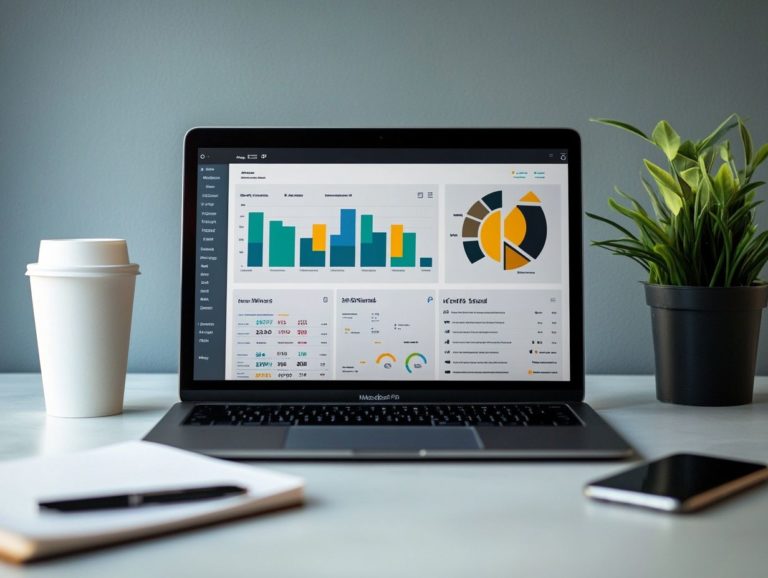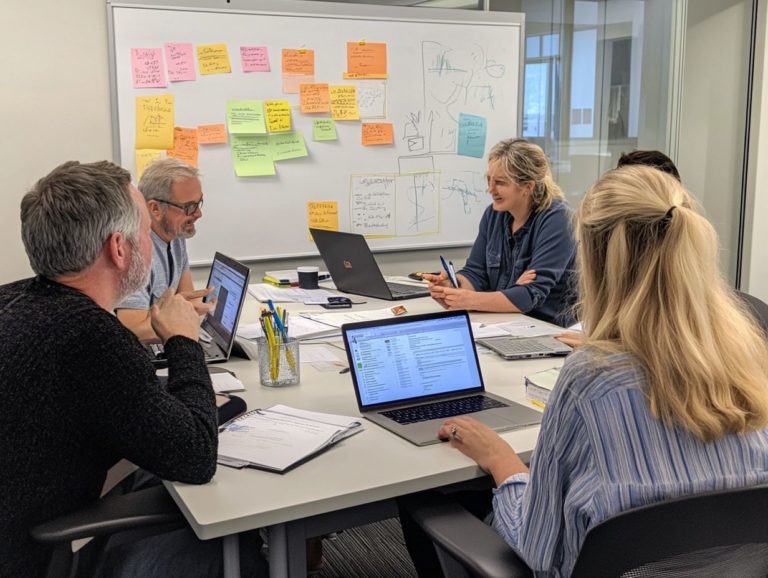10. How CRM Improves Customer Experience in Retail
In today s competitive retail landscape, grasping the nuances of Customer Relationship Management (CRM) is crucial for your success. This article delves into what CRM is and its purpose, emphasizing its key role in improving customer experiences.
Learn how CRM strategies boost customer loyalty and sales by personalizing experiences through targeted marketing and improved service.
The piece also offers practical steps for implementing CRM systems and measuring their effectiveness with key performance metrics.
See how CRM can transform your retail business today!
Contents
- Key Takeaways:
- Understanding CRM in Retail
- Importance of Customer Experience in Retail
- Ways CRM Improves Customer Experience
- Implementing CRM in Retail
- Measuring the Success of CRM in Retail
- Frequently Asked Questions
- What is CRM and how does it relate to customer experience in retail?
- How does CRM technology improve the customer experience in retail?
- What are some specific ways that CRM can enhance the customer experience in retail?
- Does implementing CRM require a large investment for a retail business?
- Can CRM help improve customer loyalty in retail?
- How can retailers ensure the successful implementation of CRM to improve customer experience?
Key Takeaways:

- Enhance customer loyalty and sales by improving their experience through CRM in retail.
- Personalization, targeted marketing, improved customer service, and efficient data management are key ways CRM improves customer experience in retail.
- Implementing best practices and tracking key metrics are crucial for measuring the success of CRM in retail.
Understanding CRM in Retail
Customer Relationship Management (CRM) in retail includes tools and software that help you manage customer data, interactions, and relationships across the entire sales cycle.
It enables you to elevate the customer experience, streamline sales processes, and cultivate loyalty through effective CRM strategies.
This approach also boosts revenue growth and enhances overall business efficiency.
Definition and Purpose
The definition of CRM software in retail involves a comprehensive suite of tools crafted to manage customer data and interactions with precision.
These tools not only streamline your communication but also offer valuable insights into customer behavior and preferences, ultimately enhancing your sales performance.
As a retailer, you can leverage CRM to identify trends, tailor your marketing strategies, and follow the 7 steps to effective CRM implementation in retail to make informed decisions that resonate with your target audience.
Using these systems helps you build stronger relationships with your customers, ensuring a more personalized shopping experience.
With effective customer management processes enabled by CRM solutions, you can efficiently handle inquiries and feedback, further elevating customer satisfaction and loyalty critical components for sustained success in today s competitive landscape.
Importance of Customer Experience in Retail
Customer experience stands at the forefront of retail, profoundly impacting customer loyalty, satisfaction, and the effectiveness of your marketing campaigns. Understanding how CRM supports customer engagement in retail can further enhance these aspects.
When you cultivate a positive customer experience, you enhance your brand’s reputation and inspire repeat business.
It’s crucial for retailers like you to prioritize robust feedback and communication channels, ensuring that every interaction resonates with your clientele.
Impact on Customer Loyalty and Sales
The impact of customer experience on loyalty is truly profound. When you ensure that your customers are satisfied, they are far more likely to make repeat purchases and recommend your brand to others, effectively enhancing the sales cycle.
In today’s competitive landscape, delivering a memorable customer experience can truly set your brand apart, transforming casual buyers into dedicated advocates.
By prioritizing personalized communication, you not only address individual needs and preferences but also cultivate emotional connections that foster loyalty.
Tailored interactions be it through targeted promotions or attentive customer service play a crucial role in shaping perceptions. As your customers feel valued and understood, their likelihood of returning increases, creating a rewarding cycle of trust and satisfaction that benefits both them and your brand in the long run.
Ways CRM Improves Customer Experience

CRM solutions significantly elevate your customer experience by delivering personalized service, fine-tuning marketing campaigns, and automating customer interactions, especially in contexts like how CRM benefits the retail food industry.
This approach cultivates a more engaging and efficient customer journey, ensuring that every touchpoint resonates with your audience.
Personalization and Targeted Marketing
Personalization and targeted marketing are vital elements of a successful CRM strategy. They allow you to tailor your offerings to align with customer preferences and insights.
By dividing your customers into groups based on similar traits, you can gain a richer understanding of your diverse clientele.
This approach opens doors to crafting marketing messages that truly resonate with specific segments.
Ultimately, it enhances customer satisfaction, as individuals feel recognized and valued.
Effective marketing strategies driven by precise segmentation elevate the overall customer experience, fostering loyalty and encouraging repeat business an essential ingredient for long-term success.
Improved Customer Service
Improved customer service, supported by CRM tools, enables you to provide proactive support and address inquiries with impressive timeliness.
By using automation tools, you can streamline response times, ensuring customers receive the assistance they need quickly.
These advanced technologies help you gather and analyze feedback efficiently, identifying trends for better service strategies.
As a result, your customer interactions become more personalized and effective, fostering a genuine sense of connection and trust.
Enhanced communication through automated systems not only resolves concerns but also anticipates customer needs, elevating satisfaction and loyalty to remarkable heights.
Efficient Data Management
Efficient data management through CRM systems allows you to maintain a centralized database that offers valuable insights into your customers and their behaviors.
This comprehensive view of customer interactions helps you streamline operations and tailor offerings to meet individual needs.
By utilizing data analytics, you can identify trends and patterns that might otherwise slip through the cracks.
Making informed decisions based on these insights boosts efficiency and cultivates deeper relationships with your customers, ensuring loyalty and repeat business over time.
Implementing CRM in Retail
Implementing CRM in retail demands a meticulous approach that aligns CRM strategies with your business objectives.
It s essential to engage stakeholders throughout the organization to ensure a seamless integration into your sales processes.
This collaborative effort enhances efficacy and drives overall success.
Steps and Best Practices

Ensuring a successful CRM implementation requires following best practices that prioritize effective customer management and strategic data use.
These practices enhance customer relationships and streamline internal processes, leading to well-considered choices.
- Begin by clearly defining your goals and objectives, tailoring the system to your specific needs and ensuring every feature has a purpose.
- Providing adequate training sessions for your staff is crucial; this helps them become familiar with the new tools and maximize their potential.
- Regular evaluations are essential to measure the effectiveness of your CRM system, allowing necessary adjustments in response to evolving business landscapes and customer demands.
Measuring the Success of CRM in Retail
Measuring the success of CRM in retail involves analyzing key metrics that illuminate customer satisfaction, sales performance, and the effectiveness of your solutions. Understanding how to use CRM to improve customer experience is essential for optimizing these metrics.
By scrutinizing these indicators, you can gain invaluable insights into how well your CRM strategies are performing and where improvements may be needed.
Key Metrics to Track
Key metrics to track in your CRM include customer satisfaction scores, revenue increase, customer retention rates, and opportunities identified through user activity analysis.
To fully understand these metrics, use different tools to measure these metrics effectively.
- Gauge customer satisfaction scores through surveys and feedback forms. This helps you pinpoint areas for immediate improvement.
- Analyze revenue increases via sales reports, tracking changes over specific periods to spotlight the strategies that work best.
- Determine customer retention rates by monitoring repeat purchases and engagement levels. This reveals how well you maintain those vital customer relationships.
- Uncover opportunities through user activity analysis by examining data patterns. This enables you to target potential leads and significantly enhance your overall CRM effectiveness.
Frequently Asked Questions
Curious about how CRM strategies in retail can revolutionize your experience? Here are some common questions answered!
What is CRM and how does it relate to customer experience in retail?
CRM means customer relationship management. This strategy helps retail businesses manage their interactions with customers by collecting and analyzing customer data, as well as implementing strategies and technologies to improve the overall customer experience.
How does CRM technology improve the customer experience in retail?

CRM technology allows retail businesses to store and analyze customer data, such as purchase history, preferences, and contact information. By using CRM to enhance customer experience, businesses can personalize their interactions with customers, resulting in a more positive and tailored experience.
What are some specific ways that CRM can enhance the customer experience in retail?
Some specific ways that CRM can help retail businesses thrive include personalized marketing campaigns, targeted product recommendations, and efficient customer support through various channels.
Does implementing CRM require a large investment for a retail business?
The cost of implementing CRM varies depending on the size and needs of the retail business. However, many affordable CRM software options are now available, making it a feasible investment for businesses of all sizes.
Can CRM help improve customer loyalty in retail?
Yes, CRM can help improve customer loyalty by allowing retail businesses to better understand their customers and tailor their interactions based on their preferences and needs. For more insights, check out how CRM enhances loyalty programs in retail. This can lead to a more positive and personalized experience, making customers more likely to return and remain loyal to the brand.
How can retailers ensure the successful implementation of CRM to improve customer experience?
To ensure the successful implementation of CRM, retailers should carefully choose a CRM system that aligns with their needs and goals, train their employees on how to use the system effectively, and regularly analyze and adjust their CRM strategies to meet the changing needs of their customers.
Ready to elevate your customer relationships? Explore CRM options today!






